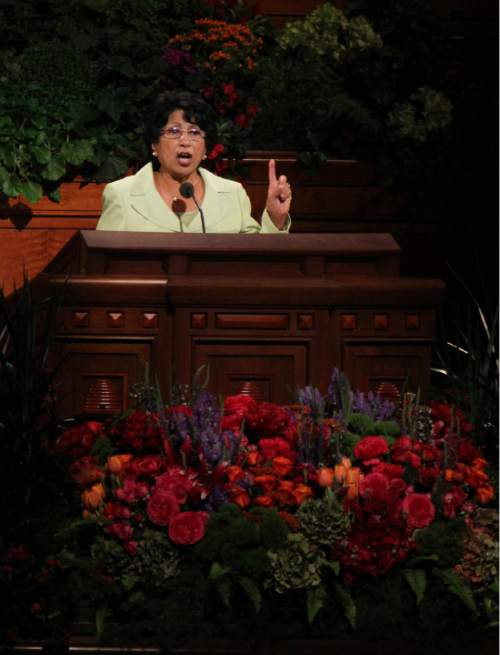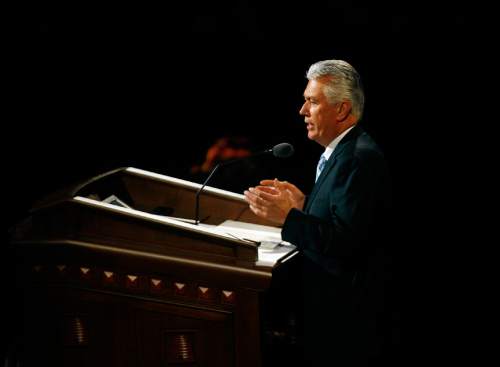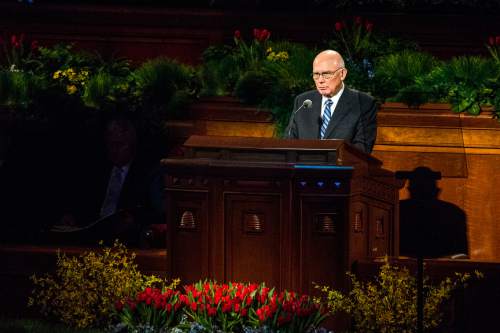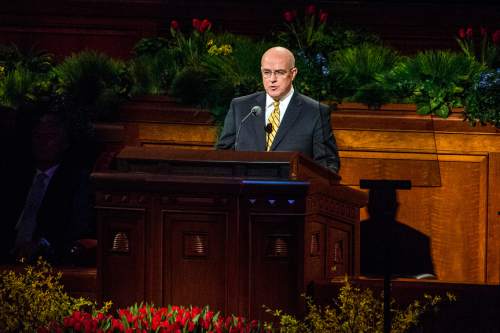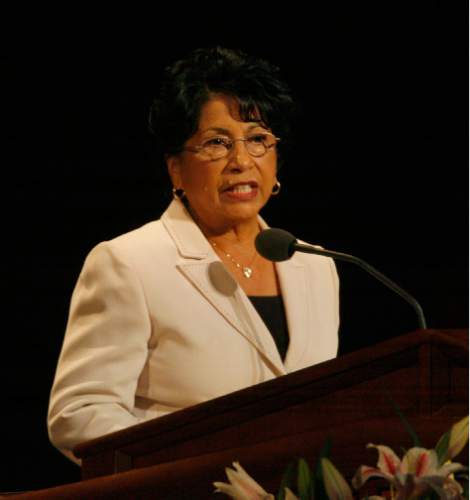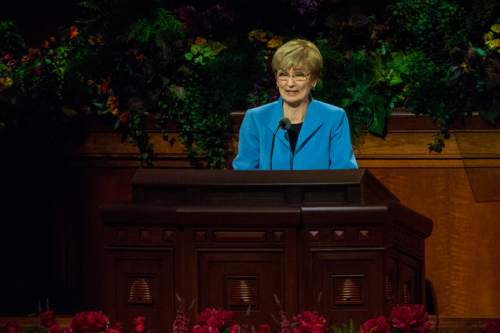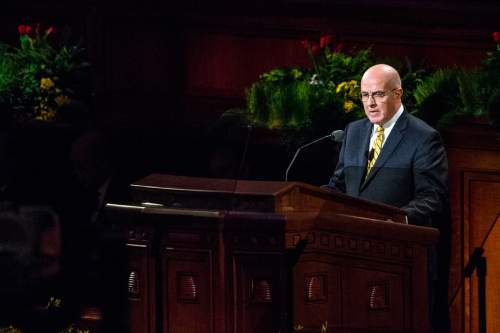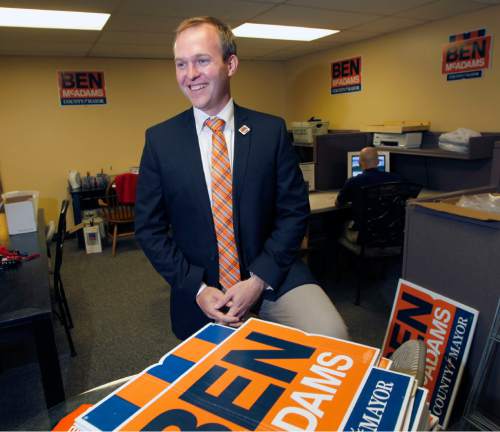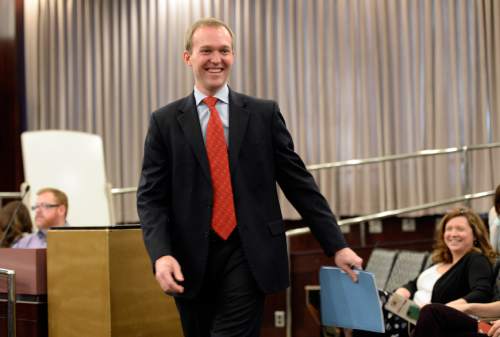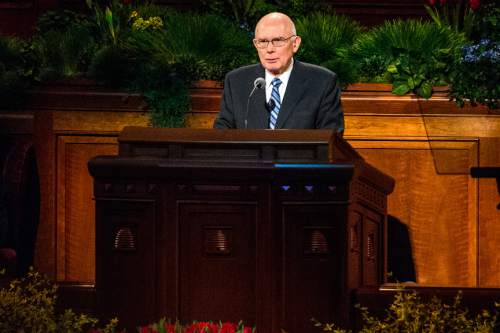This is an archived article that was published on sltrib.com in 2015, and information in the article may be outdated. It is provided only for personal research purposes and may not be reprinted.
Every six months, LDS leaders address the world's 15 million-plus Mormons at General Conference.
Their speeches — streamed, beamed and broadcast from the Conference Center in downtown Salt Lake City — are viewed as authoritative, posted on the Utah-based faith's website, printed in its official magazine and studied carefully by many members.
Some remarks make history for the church as a whole; some make memories for individual Mormons. We asked several Latter-day Saints to tell us about their favorite conference sermon and why it impressed them.
Jennifer Gonzalez • Information designer, refugee- and immigrant-rights advocate, and founder and CEO of Torchlight Legal (http://www.torchlightlegal.org), who lives in Springville and serves as the adult women's Relief Society secretary in her LDS congregation.
Silvia Allred spoke in the October 2007 conference, soon after becoming first counselor in the Relief Society General Presidency.
I was sitting in the basement of our little house in Rockville, Md., and my roommate announced that the mother of one of her childhood friends would be speaking.
"Sister Allred is so amazing," she gushed in preparation. I hadn't seen a picture of her before, and knowing my roommate was from Salt Lake City, I expected a typical, white, suburban-mom type in a brightly colored suit.
As Sister Allred's voice filled the room during her talk, titled "Feed My Sheep," my eyes snapped up at the sounds of a native Spanish speaker lightly accenting each word. For the first time in my life, I saw a woman who looked as if she could be my aunt or grandmother command the eyes and ears of the church.
I was surprised at the tears filling my eyes as she spoke about service, punctuating her message with stories about living in, not just visiting, Costa Rica, the Dominican Republic and other Latin American countries.
"I have seen visiting teaching done faithfully by walking short and long distances or by riding buses, subways or trains," Sister Allred said. "My friend Ana was a young mother in Costa Rica who faithfully did her visiting teaching every month, walking many times in heavy rain. Thirty years later, now a grandmother, she continues to be a faithful visiting teacher. She has blessed so many lives."
Sister Allred said such service should be "selfless, quiet and be done willingly, with our hearts full of the love of God and his children."
To see a Latina woman stand at that pulpit and testify to the world and to the worldwide church is a moment that will forever inspire my own journey of discipleship.
Wain Myers • Co-author of a memoir about his conversion, titled "From Baptist Preacher to Mormon Teacher," who serves as a second counselor in the Genesis LDS Branch Presidency, a monthly support group for black Mormons, their families and friends.
My favorite conference talk is "The Parable of the Sower," delivered in April by Mormon apostle Dallin H. Oaks.
This talk is one of the most powerful I have heard in General Conference to date. The reason this is my favorite talk is that Elder Oaks addressed a point that has caused me great concern for quite a few years. It seems to me that so many members of the church have confused wealth with God's favor and the lack of wealth to mean God's disfavor.
Elder Oaks cleared up any confusion that might exist when he said, "Those who believe in what has been called the theology of prosperity are suffering from the deceitfulness of riches. The possession of wealth or significant income is not a mark of heavenly favor, and their absence is not evidence of heavenly disfavor."
This spoke to the core of my soul. I was so overwhelmed that it brought me to tears. To those members who feel you are favored of God because of your wealth, think again.
Whitney Johnson • Writer and organizational expert who just published "Disrupt Yourself: Putting the Power of Disruptive Innovation to Work and co-founded an investment firm with another Mormon, Harvard's Clayton M. Christensen.
I loved an October 2014 talk, "The Sacrament: A Renewal for the Soul," by Cheryl A. Esplin, second counselor in the Primary General Presidency, which oversees LDS children's programs.
It had never occurred to me that the sacrament could be a time for thinking not about what I'd done wrong, but rather what I'd done right "because of Christ's enabling power."
Paradoxically, as I shift my focus from self-recrimination to what good thing couldn't have happened in my life without the atonement of Jesus Christ, I am more open to receiving promptings of what I could do better, to repent.
"Our wounded souls can be healed and renewed not only because the bread and water remind us of the Savior's sacrifice of his flesh and blood," Sister Esplin said, "but because the emblems also remind us that he will always be our 'bread of life' and 'living water.' "
Her talk marked a huge mental shift in my understanding of the atonement.
Ben McAdams • Salt Lake County mayor.
A favorite is the April 2015 talk "Choose to Believe," by L. Whitney Clayton, a member of the Presidency of the Seventy.
I have watched people I love struggle to hold on to the faith and belief that previously have given meaning and purpose to their lives.
I know that doubt or disagreement can easily arise, and I deeply feel the painful internal struggles that this discord creates. And yet, I choose to believe.
As Elder Clayton said, "Belief and testimony and faith are not passive principles. They do not just happen to us. Belief is something we choose — we hope for it, we work for it and we sacrifice for it."
I cultivate my own belief today and draw strength from the people and experiences in my life that inspire my hope for a bright tomorrow.
Helen Claire Sievers • Executive director of WorldTeach, a nongovernmental organization that originated at Harvard and partners with ministries of education to send volunteers to teach in low- and middle-income countries.
I loved President Dieter Uchtdorf's October 2013 conference address "Come, Join with Us."
I was very drawn to his expansive kindness and his profound respect for human agency. I was reminded of the poem by Edwin Markham, about exclusion and inclusion, which ended in
" ... Love and I had the wit to win:
We drew a circle and took him [us] in."
That's what President Uchtdorf did in this talk; he took us all "in." He eloquently invited us all to be part of the fabric of the church, whoever we are, and whatever our circumstances.
"Brothers and sisters, dear friends, we need your unique talents and perspectives," he said. "The diversity of persons and peoples all around the globe is a strength of this church."
It really is, including the diversity here at home. When he said, "Come and add your talents, gifts and energies to ours. We will all become better as a result," I thought, yes, I'm "in," count on me. I definitely want to belong when you put it this way.
When he asked, "If you seek truth, meaning and a way to transform faith into action; if you are looking for a place of belonging: Come, join with us," I thought, that is exactly what I am looking for — truth, meaning and a way to transform faith into action. Exactly. I've not heard a more succinct statement of what I am looking for in life or why I am active in the church.
He then summarized with the warm and welcoming statement, "With our heart and soul, we yearn to become better with the help of the atonement of Jesus Christ. If these are your desires, then regardless of your circumstances, your personal history or the strength of your testimony, there is room for you in this church. Come, join with us."
Pretty spectacular stuff.


